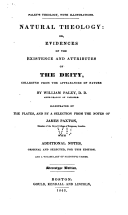A Watch Implies a Watchmaker Argument
In crossing a heath, suppose I pitched my foot against a stone, and were asked how the stone came to be there, I might possibly answer, that, for any thing I knew to the contrary, it had lain there for ever: nor would it perhaps be very easy to shew the absurdity of this answer. But suppose I had found a watch upon the ground, and it should be enquired how the watch happened to be in that place, I should hardly think of the answer which I had before given, that, for any thing I knew, the watch might have always been there.
Notes:
Early example of it from 1802.
Folksonomies: creationism
Taxonomies:
/style and fashion/accessories/watches (0.236504)
/hobbies and interests/arts and crafts/watchmaking (0.202561)
/law, govt and politics (0.190191)
Keywords:
Watchmaker Argument Early (0.980303 (positive:0.563627)), thing (0.572070 (negative:-0.314774)), answer (0.564202 (negative:-0.512790)), stone (0.519414 (negative:-0.483626)), absurdity (0.502765 (neutral:0.000000)), contrary (0.502220 (negative:-0.371700)), example (0.488729 (positive:0.563627)), heath (0.487020 (neutral:0.000000)), foot (0.466418 (negative:-0.483626)), ground (0.463862 (negative:-0.583624))
Concepts:
Stone (0.911360): dbpedia
Watchmaker analogy (0.886784): dbpedia | freebase | yago
Question (0.870400): dbpedia | freebase





